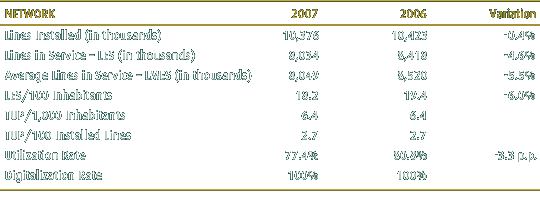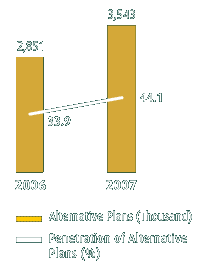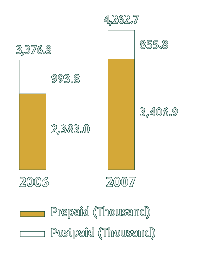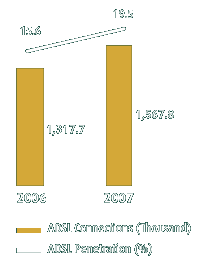







Serving an extensive customer base with distinct needs-such as residential subscribers and corporate customers-will always be challenging. Over the past years, Brasil Telecom has stood out for its capacity to innovate its supply, and was the first the launch products such as: IPTV (transmission of movies on-demand using the broadband platform); the Único (a mobile phone that transmits signals to the fixed line network while in the residential environment, thus reducing costs for the subscriber); and the Pula-Pula (free minutes in function of the volume of incoming calls), among others.
In 2007, over 885 thousand customers were added to mobile operations and 250 thousand to the broadband service, totaling-jointly with fixed line operations-a customer base of over 13 million customers: a growth of 5.7% year-on-year.
FIXED LINE
In 2007, competition increased from both paid-TV companies and mobile operators that had positioned themselves in the market with alternative plans and solutions for traditional fixed line telephony.
We also observed a continuous reduction in the penetration of fixed lines, a consequence of fixed-mobile migration. This change was accelerated by a reduction in the price-per-minute charged by mobile operators, associated with a strong presence of mobile operators in mass media.
At the end of 2007, Brasil Telecom's terminal network was composed of 10.4 million installed lines, 8 million of which were in service, as follows:
| Indicators - Fixed line network |
 |
Given this scenario, Brasil Telecom focused its activities on the maintenance and profitability of its terminal base, as well as on the expansion of products and alternative plans offered.
Among the alternative plans offered, the highlight is the "Conta Completa" (Full Bill) plan, which leveraged sales of alternative plans with participations above 60% in the 2007 sales mix. This plan allows customers to choose the amount of minutes according to their usage profile, for each type of call: local fixed line, to mobile phones, and long-distance calls.
In the economic plans segment, the "Controle Total" (Total Control) plan was created, a 100% prepaid plan with monthly billing and minutes that may be used both in local fixed-mobile calls within Brasil Telecom's network and between fixed line telephones of any operator. In addition, there is the possibility of topping up via the Cartão Único (Single Card) in the amounts of R$15, R$20, R$30, and R$60.
In addition, plans have been created to assist customer retention, with the new offers called "Brasil Total" and "Brasil Total Negócios" (Brazil Total Business), with packages that include local fixed lines, long-distance, intelligent services, mobile telephony, and broadband.
In compliance with ANATEL's Resolution 423, Brasil Telecom successfully concluded, on July 31, 2007, the complex implementation of the conversion in billing, from pulses to minutes, for local calls between fixed lines.
This change in billing enabled the Company to offer its customers an easier way to monitor and control their expenses, and to make better use of the advantages of alternative minutes consumption plans.
| Alternative Local Fixed Line Plans |
 |
Proceeding with the strategies of promoting the adoption of alternative plans, and approaching the market in an increasingly segmented manner, at the end of 2007 Brasil Telecom had 3,5 million lines in alternative local fixed line plans, representing 44.1% of lines in service, as follows:
Brasil Telecom maintained its leading position in the long-distance market, and recorded an average market share of 90.0% in the intra-regional segment and 84.80% in the inter-regional segment. The Company closed the year with a 64.0% market share in the inter-regional segment and 38.6% in the international segment.
The highlights in long-distance plans are: "14 Simples" (Simple 14), with 30 minutes for domestic long-distance calls; "14 Meu Perfil" (14 My Profile), with different tariffs for in-state calls; and "14 Minhas Cidades" (14 My Cities), with discounted tariffs for three cities chosen by the customer.
Tariffs
With regard to 2007 tariffs, ANATEL authorized Brasil Telecom to adjust tariff items in the Basic Plans of Local and Domestic Long-Distance (DLD) Services, pursuant to the Concession Agreements. Average adjustments authorized for the local and DLD services amounted to 2.14%. The Local Network Use Tariff (TU-RL) was adjusted by 2.14% and the Interurban Network Use Tariff(TU-RIU) was reduced by 0.13%. Basic PSTN Plans, Local and DLD, for calls involving mobile phones, VC-1, VC-2, and VC-3 were adjusted by 3.29%, as of July 20, 2007.
MOBILE TELEPHONY
By the time it completed three years of operation, Brasil Telecom Móvel had reached over four million subscribers. Although Brasil Telecom Móvel was the fourth-largest operator providing service in the region with the greatest penetration rates in Brazil-Region II-the Company's goal has always been to be the leading integrated operator offering all telecom solutions to the customers in its operation area. The total number of connections grew 26%, whereas the Brazilian market grew, on average, 21%.
During 2007, Brasil Telecom implemented coverage to 54 new locations, and now serves a total of 873 locations, or 87% of Region II's population, representing an increase of 6.6% year-on-year. In addition, several expansions have been performed to previously-served locations.
In the Northern and Mid-Western states (Area 7), Brasil Telecom Móvel occupies third position in market share in six states: the Federal District, Goiás, Mato Grosso, Tocantins, Acre, and Rondônia. In other states, the Company holds fourth place.
| Evolution of Mobile Accesses |
 |
In 2007, the number of gross additions to Brasil Telecom Móvel reached 2.6 million connections, due mainly to the quality of services provided and to Brasil Telecom's vocation for innovative solutions. The following offers were launched in this period: "Fale de Graça no Orelhão" (Talk for Free from Public Phones), "Fale de Graça à Noite" (Talk for Free at Night), and "Fale de Graça aos Domingos" (Talk for Free on Sundays), through which Brasil Telecom Móvel's customers may place free calls to Brasil Telecom's fixed and mobile terminals. The inclusion of the lines in service of Brasil Telecom Fixa as possible destinations for these calls increased the number of possible connections from around 4.3 million (total BrT Móvel customers) to approximately 12.3 million (total mobile and fixed line customers).
Aiming to increase revenues from mobile data communication, new functionalities were created by means of Internet services and content, such as Orkut (social networking), Glu (games), Som Licre (music), and Discovery. The Company also executed partnership agreements with content companies, such as Dada.net, Blinko, Spin My Mobile, Flycell, Ligaki, Memo, Sony Pictures, Neo Network, and Móbile Streams, in addition to making the e-mail package "Escritório Móvel" (Mobile Office) available through Nokia's Intellisynk solution. Several offers and initiatives have been made to services and content already available to customers. The initiatives generated discounts for multimedia messages and prizes resulting from cultural contests, such as the m-Encontra service promotion, in which customers could win cruises to the Brazilian Northeast.
By the end of 2007, Brasil Telecom counted on 3,017 points of sale, distributed among 28 own stores, 35 kiosks, 683 authorized agents, and 2,271 resellers in the main retailer chains, as well as 76 top-up distributors, serving approximately 120 thousand active points of sale.
Tariffs
The tariff adjustment contributed to the increase in Brasil Telecom Móvel's revenues. In 2007, postpaid plans were adjusted 5.7%, without, however, affecting their competitiveness.
DATA COMMUNICATION
| ADSL Connections |
 |
Brasil Telecom added 250.1 thousand broadband (ADSL) connections to its network, totaling 1,567.8 thousand connections by the end of the year: a growth of 19% year-on-year. The 19.5% penetration rate of these connections over fixed lines in service, the greatest among fixed line concessionaires in the country, is a strategic support for the offering of new services and applications.
Continuous growth in broadband Internet services was maintained throughout the year, supported by the expansion of the Turbo portfolio (commercial name of ADSL) with the launching of three new standard connection speeds: 2MB, 4MB, and 8MB, as well as higher speeds on-demand, based on ADSL 2+ technology, and through the offer of quadruple play packages in partnership with Sky. These speeds aim to meet the demand for new tools and audio and video content, typical of Web 2.0 available to users. More than half of the 1,565 locations served with broadband already possess ADSL 2+ technology, and will provide customers with access to new services, such as IPTV.
Brasil Telecom has also expanded its range of options for dial-up access to the Internet, which is the entrance portal to broadband service. In 2007, the Company created plans that enabled dial-up access to the Internet with fixed monthly payments, such as "Internet Toda Hora" (Internet All the Time) and "PC Conectado" (Connected PC). The latter is an alternative commuted fixed line plan that supports the Federal Government's Projeto Cidadão Conectado: Computador Para Todos - Connected Citizen project: Computers for Everyone, to promote the digital inclusion of lower-income households. The plan offers, in addition to voice services-another service that is specific to dial-up access to the Internet-at very low prices, allowing users to expand their habit of accessing the Internet beyond reduced-tariff hours.
In addition, in 2007 Brasil Telecom offered its customers mobile broadband access with the 2G EDGE technology. Next year, this service will be offered in 3G (1.8 GHz and 2.1GHz). Fiber optic solutions for broadband Internet access, FTTH and FTTB (Fiber to the Home and Fiber to the Building), have been installed in Brasília and Porto Alegre. As a supplement to the fixed system (mainly ADSL), wireless high-speed Internet access systems (WiMAX) were installed in Curitiba, Porto Alegre, and São Paulo.
CONVERNING PRODUCTS

Convergence has come into demand from a wide variety of consumers. In view of this, Brasil Telecom has been investing the development of converging solutions for fixed and mobile; and broadband and video services. This year, we signed a partnership with Sky, which allowed the Company to offer packages including Digital Paid-TV.
Telefone Único – An innovative solution in Brazil and in the world that uses CTP (Cordless Telephony Profile) technology, allowing for fixed and mobile Convergence has become the demand of a vast array of consumers Annual Report 2007 60 | 61 voice services to be used in the same mobile handset. With the product, Brasil Telecom builds loyalty with customers in the fixed telephony base; increases its market share in mobile telephony, offering new value-added services; promotes the sale of postpaid plans; and maximizes the efficiency of the fixed line and mobile networks.
Cartão Único – This card enables customers, through the acquisition of top-ups (R$15, R$20, R$30, and R$60), to recharge in all prepaid services, fixed terminals (AICE, Total Control, and Ligmix), and mobile terminals of Brasil Telecom.
PABX Virtual Único – OPABX Virtual Único is a converging solution to meet corporate needs. With it, the customer no longer has acquisition, operation and maintenance costs over PABX equipment, since the entire infrastructure is housed by Brasil Telecom. With this, the Company was the first operator to converge fixed and mobile lines in branches.
Quadruple Play: Sky Partnership – In this commercial partnership with SKY, Brasil Telecom offers packages including fixed line and mobile services, broadband, and Digital Paid-TV. This offer consolidated throughout 2007 as a competitive advantage against other Triple Play offers by the competition. The package accounts for approximately 10% of all Brasil Telecom broadband sales.
INTERNET PROVIDERS
The relevance of the Internet in Brazil is represented by the increase in single visitors and connection times. With approximately 21.4 million Internet users, we are the leading country in time spent online. According to Ibope/NetRatings, residential Internet users spend an average of 23 hours online per month.
In response to this scenario, advertising investment on the Internet is expected to grow 30% in 2007, according to estimates by the Inter-Meios project.
With an eye on market changes, Internet Group, Brasil Telecom's business unit, intends to become the leading brand in interactive media. The goal is to reach this target through investments in interactivity from the extension of the current products and services platform.
Internet Group, which includes the activities of Internet providers iG, iBest, and BrTurbo, is the largest Internet provider in Brazil, with 4 million users of free dial-up connections; and the second largest broadband Internet provider in the Brazilian market, with 1.34 million paying subscribers at the end of 2007. Traffic generated by connected customers reached 44.6 billion minutes in 2007. iBest and iG accounted for 66.8% of the minutes of Region II in the first eleven months of 2007, positioning Internet Group as market leader in the region. As for broadband, the group grew by 27% in number of subscribers year-on-year. Of all broadband customers in Region II, 69% are estimated to be customers of iG or BrTurbo, positioning the company as the region's market leader.
The paying customer base of Internet Group's value-added services grew 134% between 2006 and 2007, reaching 750 thousand customers. This increase was led by products aimed at residential consumers, among them Protégé (antivirus), Resolve (24/7 technical support by phone), and Educa (content product targeted at family education).

According to Ibope/NetRatings, in December, 2007, Internet Group ranked third place among its main national competitors, with over 11.2 million single residential visitors, representing an annual growth of 43%. 2007 was a year marked by the launching of the new portal and new channels, such as Celebridades (Celebrities), Tecnologia (Technology), Eu na Web (Me on the Web), and others.
For iG, the Internet user plays the main role, and this is why the portal launched, in early 2006, the campaign "O mundo é de quem faz" (The world belongs to those who make it), introducing the concept of leadership by the masses. Minha Notícia (My News), created in June of that year, was the first Internet space in Brazil created for so-called Citizen- or Participative Journalism, which is considered a global trend, and places the portal ahead of other Brazilian Internet portals. In line with this proposal, iG makes several tools available to Internet users, such as blogs and MinhaTviG, which allows users to create, edit, and distribute content.
The portal - focusing on the continuous innovation of products and services - created in 2007, for the first time on the Internet, the position of ombudsman; it launched the Essay Manual of the online newspaper, which pursues greater transparency in the processes and standards used to verify, edit, and publish news; and established partnerships with Google and Kaizen Games. The unique partnership in the Brazilian market with Google enables iG to offer its subscribers and users cutting-edge products and services, such as e-mail and a search engine. As for e-mail, the Google partnership extended Gmail to 7.8 million iG e-mail accounts. For its part, the association with Kaizen Games enabled iG to bring the virtual world of Second Life to Brazil. Second Life, which already has 11.9 million residents worldwide and 644 thousand participants in Brazil, expands the concept of a game to the parallel virtual universe, promoting the creation of communities.
iG's successful results come not only from internal efforts in developing content, technological platforms, products, and services, but also from the continuous focus in meeting the needs of subscribers and Internet users.
![]()
VIDEON: THE FUTURE ON YOUR TV
Brasil Telecom works to enhance the experience of customers throughout their entire relationship with the Company: from the advertising campaign; through all the stages of obtaining the service, using the service, and billing; to loyalty building.
It was through thinking of its customers' comfort and reassuring its commitment to offering innovative services as a converging operator that Brasil Telecom launched, in 2007, the first Internet Protocol Television (IPTV) service. Named Videon, the product distributed, through the Company's ADSL 2+ broadband infrastructure, audiovisual content over Internet Protocol.
The service is initially being offered in Brasília, but it will be expanded to the main capitals and cities in the region where Brasil Telecom operates in 2008.
Videon is a cutting-edge product that revolutionizes the way audiences watch TV. It offers a library of audiovisual content, composed of unique content such as movies, documentaries, concerts, children's shows, and cultural shows. With similar functions to a DVD device, the service offers approximately 500 hours of programming, which may be enjoyed at any time, regardless of the programming schedule.
The Company has signed partnerships with international providers, among them MGM, Disney, Universal, DLA, Playboy, Turner, and Viacom (Nicklodeon and VH1), in addition to agreements with Brazilian producers such as TV Cultura, Lumiére, SESC TV, the Ministry of Education, and TV Escola. There are other ongoing negotiations aimed at further improving content offered and increasing the range of options to customers.
In addition to local movie rental, Brasil Telecom also provides Videon customers with the so-called Subscription Video on Demand (SVoD), which is the rental of specific content, grouped by theme or TV series, such as educational programming, children's shows and documentaries.
The IPTV offer has only been possible because Brasil Telecom possesses the most complete high-speed network among all fixed line and mobile operators in Brazil. With Videon, the Company reached a new technological level. The greatest beneficiary is the customer, who can, according to his or her profile, design a programming schedule and use an even wider range of services.
Current legislation forbids the Company from offering regular paid-TV channels to its concession area. Pending a change in this law, however, Brasil Telecom is prepared to expand its service.
![]()